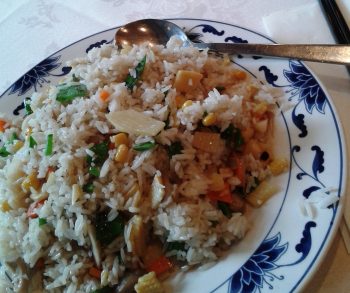Getting Fat in Chinese Posted by Ayana on Sep 3, 2018 in Uncategorized
Every visit to China is a culinary pleasure. Chinese food is too delicious to refuse. I love rice, tofu, noodles, dumplings, and I gorge on all the 10 must-try foods in China. No wonder why I always return home with some extra kilos.
胖pàng
胖(pàng) is an adjective meaning “fat”. It is an easy character to write: it consists of the radical 月, which often can be found in body related characters (like: 脸liǎn for face, and腰yāo for waist). And the second component 半 (bàn) implies the character’s pronunciation. 胖 is used to describe people. For example:
- 他身子很胖。
Tā shēnzi hěn pàng.
He is very fat.
- 她胖得腰身也看不出了。
Tā pàng dé yāoshēn yě kàn bù chūle.
She is so fat, you can’t even see her waists.
Although an adjective, 胖by itself can also be translated as “becoming fat”, according to the context. For example:
- 为什么有的人吃得并不多,却很容易胖?
Wèishéme yǒu de rén chī dé bìng bù duō, què hěn róngyì pàng?
How come some people don’t eat much and still getting fat?
- 胖是因为贪吃和懒?
Pàng shì yīnwèi tān chī hé lǎn?
Do gluttony and laziness cause obesity?
变胖biàn pàng
变 (biàn) is a verb, meaning “to change”, or “to become”, and together with the adjective 胖 it literally means “to become fat”, or in other words “to gain weight”.
- 最近我变胖了。
Zuìjìn wǒ biàn pàngle.
I’ve put on weight lately.
- 喝酒会变胖吗?
Hējiǔ huì biàn pàng ma?
Does drinking alcohol can make you fat?
- 她在大学期间变胖了,但现在她很注意饮食。
Tā zài dàxué qíjiān biàn pàngle, dàn xiànzài tā hěn zhùyì yǐnshí.
She became fat during college, but now she is very careful about her diet.
发胖fā pàng
发 (fā) is a multifunctional verb. One of its meaning is similar to the verb above 变 – “to become”. Together with 胖 it also means “to become fat”.
- 他渐渐发胖了。
Tā jiànjiàn fāpàngle.
He gradually gained weight.
- 巧克力会使她发胖。
Qiǎokèlì huì shǐ tā fāpàng.
Chocolate could make her fat.
- 老年人因为活动量不足会发胖。
Lǎonián rén yīnwèi huódòng liàng bùzú huì fāpàng.
Due to un sufficient activity, elders likely to gain weight.
—————————————————————————————————————
Four reasons why I’m putting on weight on my visits to China:
- 晚饭我吃饱了。
Wǎnfàn wǒ chī bǎole.
I eat until full at dinners.
你吃饱了吗? (nǐ chī bǎole ma?) is a question I hear quite a lot in China. Every time I’m invited to dinner, at some one’s home or out in a restaurant, my Chinese host always makes sure I’m satiated. And when the round table laden with 地三鲜 and other vegetarian dishes I always 吃饱了.
- 我常常狂吃饺子。
Wǒ chángcháng kuáng chī jiǎozi.
I often gorge on dumplings.
狂 (kuáng) is an adverb meaning “wildly”, and it can be added to various verbs. For example: 狂喝 (kuáng hē) literally means “to crazily drink”; 狂叫 (kuáng jiào) when referring to people can be translated to “to scream”, or “to shout”.
- 我通常暴饮暴食。
Wǒ tōngcháng bàoyǐn bàoshí.
I usually overeat.
暴饮暴食 (bàoyǐn bàoshí) is an expression, meaning “binge eating”. 饮 (yǐn) is a “drink”, and 食 (shí) is “food”, and the expression describes over eating and drinking.
- 中国食物太油腻了。
Zhōngguó shíwù tài yóunìle.
Chinese food is too greasy.
油 (yóu) and腻 (nì) are both adjectives meaning “oily”. You can use them together or only one of them to describe greasy food.
————————————————————————————————————
Greasy or not it’s delicious. Next time you are in China try as many dishes as you can. Bon appetite!
好好学习,天天向上!

Build vocabulary, practice pronunciation, and more with Transparent Language Online. Available anytime, anywhere, on any device.





Leave a comment: